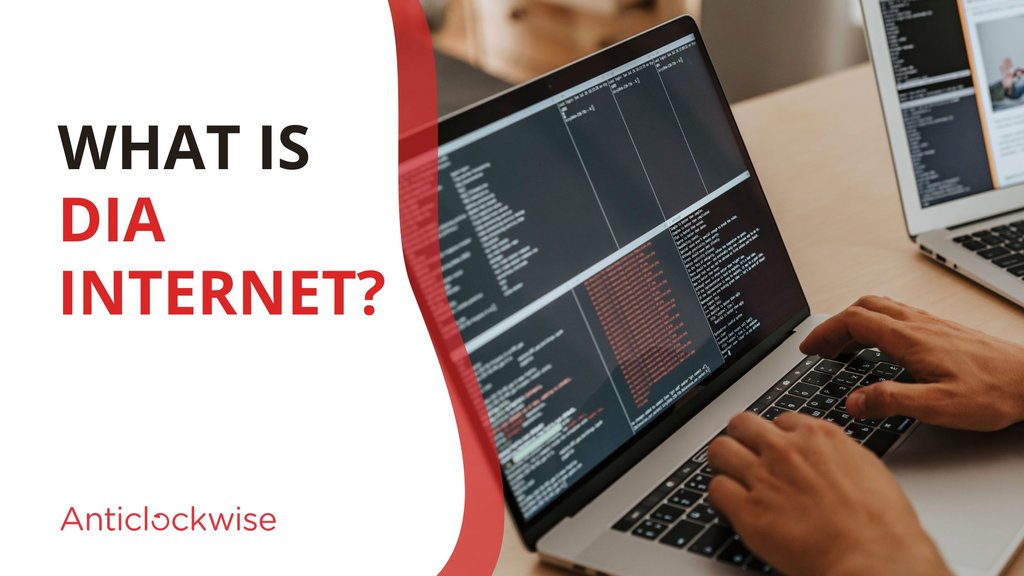
What is DIA Internet?
Understanding DIA Internet
Businesses that require constant, high-speed internet depend on Dedicated Internet Access (DIA) to provide a superior online experience.
Unlike shared internet, DIA offers a dedicated, private connection that ensures exclusive bandwidth to a given place. This guarantees continuous performance for important business activities.
To meet the varying business internet demands and IT infrastructure, DIA uses a variety of delivery techniques, including fibre optic cables, Ethernet over fibre, and copper-based Ethernet.
Key Components of DIA:
Dedicated Fibre Optic Connection: A physical, private cable connects your business to the internet backbone, providing unique bandwidth and low latency. This provides stable performance, even during peak usage.
Static IP addresses: Provides your company with a consistent online presence. DIA often covers servers, email, and apps that require a stable IP address.
High Bandwidth: DIA ensures a specific amount of bandwidth for your exclusive use. This means that internet speed will be consistent and predictable, regardless of network congestion. Enjoy consistent upload and download speeds, which are essential for cloud apps, video conferencing, and remote work.
What is DIA Direct Internet Access?
A private, dedicated internet connection is provided by Dedicated Internet Access (DIA), which is designed for companies with high network requirements. In contrast to shared broadband, DIA creates a direct connection between your company's website and the internet.
Businesses can use DIA's premium internet service with a dedicated, private connection. Unlike traditional broadband, where shared resources can cause delays and variable performance, this guarantees uninterrupted bandwidth.
Compared to standard broadband internet, DIA has a number of significant advantages. DIA offers dedicated bandwidth, ensuring consistent performance independent of network traffic, in contrast to broadband, where bandwidth is shared among several users, leading to congestion and slower speeds. Furthermore, although broadband frequently has asymmetrical rates, DIA typically offers symmetrical upload and download speeds, which are necessary for applications like video conferencing and massive file transfers. DIA offers businesses a dependable high speed internet connection that is essential to their operations. It does this by assuring uptime, latency, and performance through Service Level Agreements (SLAs). However, because broadband depends on network traffic, it provides less reliable promises and less consistent performance.
How DIA Internet Works
Unlike traditional internet, where your data shares the road with everyone else, DIA establishes a separate lane only for you. This means that your data is transmitted directly and exclusively from your organization to the internet backbone.
Here's a simple breakdown:
- Data Creation: When you send an email, visit a website, or watch a video, your device generates data packets.
- Data Transmission: These data packets travel from your company's network to the DIA connection point.
- Direct to Backbone: The DIA connection sends these packets directly to the internet backbone, skipping the common public internet.
- Data Delivery: The internet backbone then routes data packets to their eventual destination, which can be another computer, a server, or a website.
Because DIA provides a dedicated connection, your data does not compete with other users for bandwidth. This leads to quicker speeds, lower latency (less delay), and a more dependable connection for your organisation.
Benefits of DIA Internet
High Speed and Low Latency
DIA provides improved performance with dedicated bandwidth, minimal latency, and symmetrical speeds. Unlike shared internet connections, which can fluctuate, DIA provides consistent performance, making it suitable for organizations that handle massive files, cloud apps, or video conferencing. Its low latency allows for flawless real-time operations, while symmetrical upload and download rates improve data transfers and collaboration.
Reliability and Uptime
DIA is linked to dependability. As a dedicated connection, it provides steady performance without the fluctuations of shared internet. The reduced likelihood of interruptions and timely issue resolution help to reinforce DIA's image. With rigorous Service Level Agreements (SLAs) that guarantee uptime and performance, DIA gives organizations the peace of mind they need to focus on core operations. This dependability is especially important for firms that rely on consistent online services.
Looking for a reliable DIA provider for your business?
Fast, Reliable, and Secure DIA Solutions. Speak with an Expert Today!
Security
DIA provides increased security through network isolation. DIA greatly minimizes the danger of unauthorized access, cyberattacks, and data breaches compared to shared internet. This increased security, combined with DIA's dependability and speed, makes it an excellent solution for enterprises that require robust and consistent network performance to protect sensitive data and drive operations.
DIA Internet vs. Other Connection Types
Comparison with Broadband
DIA provides a dedicated, private internet connection, ensuring exclusive capacity and greater performance over broadband, which is shared by several customers.
Speed: DIA delivers much faster and more consistent speeds, regardless of network congestion. Broadband speeds differ according to user activity.
Reliability: DIA's dedicated infrastructure ensures higher reliability, with fewer outages and constant performance. Broadband is prone to service outages and delays.
Cost: DIA often has higher prices due to its specialized infrastructure and increased bandwidth. However, the investment often produces a higher return due to increased productivity and reduced downtime.
While broadband may be a cheaper option for some, businesses that require constant, high-speed internet frequently find DIA to be the more dependable and efficient option.
Comparison with MPLS
DIA (Dedicated Internet Access) and MPLS (Multiprotocol Label Switching) are both dedicated connectivity solutions, but they serve distinct purposes.
- DIA
- Purpose: Provides high-speed internet connection from a single location.
Ideal for businesses that need a dedicated connection for internet-based applications and services. - Cost: In most cases, it is less expensive than MPLS.
- Purpose: Provides high-speed internet connection from a single location.
- MPLS
- Purpose: Sets up a private network that connects numerous places.
Ideal for: Organisations with several sites that need safe, dependable, and managed network connectivity. - Cost: Typically, higher owing due to network complexity and additional functionality.
- Purpose: Sets up a private network that connects numerous places.
Choosing the Right DIA Internet Provider
Key Factors to Consider
Choosing the right DIA internet service provider is pivotal to business success. Several critical factors must be considered:
- Service Availability: Make sure the vendor provides DIA services in your unique location. A strong online presence frequently leads to cheaper pricing and faster installations.
- Pricing: Evaluate pricing structures, including up-front costs, monthly fees, and additional charges. Transparent pricing is vital.
- Service Level Agreements (SLAs): Strong SLAs that ensure network uptime and performance are critical. Clearly defined measurements and punishments for service disruptions are required.
- Bandwidth Options: Evaluate the available bandwidth options to suit current and future business requirements. Scalability is critical for growth.
- Customer Support: Providing dependable technical help is critical. Evaluate the support channels, response times, and general service quality.
Dedicated Internet Access (DIA), which provides fast speed, low latency, reliability, and better security, is an essential part of today's company operations. It offers a private network, ensuring reliability and empowering companies to maximize efficiency, increase output, and enhance client happiness. Data-intensive applications, real-time communication, and secure transactions are the reasons why industries such as finance, healthcare, e-commerce, and media depend on DIA. Cloud-based solutions and remote work models are becoming commonplace in business, and for smooth collaboration, effective data transmission, and continuous operations, DIA is essential.
Businesses are increasingly adopting cloud-based solutions and remote work practices, making DIA vital. It lays the groundwork for seamless cooperation, fast data transfer, and continuous operations. Investing in DIA not only improves an organization's current performance, but also positions it for future digital development and innovation.

Managing Director
